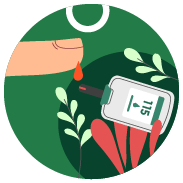Overview
- Diabetes mellitus refers to a group of diseases that affect how your body uses glucose. Glucose is essential for your health. It’s a great source of energy for cells that develop your muscles and tissues.
- Chorionic diabetes can categorize into type 1 diabetes and type 2 diabetes.
- Potentially reversible diabetes includes prediabetes and gestational diabetes.
- The underlying causes of diabetes vary by their type. No matter what type of diabetes you have, it increases sugar in your blood.
- Nearly 122 million Americans are suffering from diabetes (37.3 million) or prediabetes (96 million).


If you’re suffering from diabetes, your body doesn’t either produce insulin or can’t use insulin as it should. When there is a lack of insulin or cells don't respond to insulin, blood sugar stays in your bloodstream. It leads to severe health issues such as heart and kidney diseases.
Types of Diabetes
Four major types of diabetes include:
| Types | What it entails |
| Type 1 | Type 1 diabetes is caused by an autoimmune reaction that stops your body from producing insulin. Its symptom often develops quickly, diagnosed in children, teens, and young adults. Nearly, 5-10 percent of people who suffer from diabetes have type 1. |
| Type 2 | In type 2 diabetes, your body doesn't use insulin and doesn't keep blood sugar at a normal level. It is usually diagnosed in adults and develops over time. Approximately 90-95 percent of people have type 2 diabetes. |
| Gestational | It develops in pregnant women who never had diabetes. Your baby can be at higher risk of health problems with gestational diabetes. It ends post-delivery but increases the risk for type 2 diabetes later. |
| Prediabetes | In the United States, 96 million adults have prediabetes. With prediabetes, blood sugar level goes higher. It increases the risk for type 2 diabetes, heart disease, and stroke. |
Some less common types of diabetes are monogenic diabetes syndrome, cystic fibrosis-related diabetes, and drug or chemical-induced diabetes.
What Are the Symptoms of Diabetes?
If someone has any of the following diabetic symptoms, they should consult a doctor immediately.
- Increased thirst
- Feeling tired or weak
- Blurred vision
- Frequent urination
- Weight loss
- Dry mouth
- Numbness in hands and feet
Type 1 Diabetes Symptoms
Type 1 diabetes symptoms can develop in a few weeks or months and can be severe. People who suffer with type 1 diabetes, may have:
- Nausea
- Vomiting
- Stomach pain
Type 2 Diabetes Symptoms
Type 2 diabetes symptoms often take years to develop, and some people may not notice the following symptoms.
- Increased hunger
- Increased thirst
- Increased urination
- Tiredness
Gestational Diabetes
Most women with gestational diseases don't have any symptoms. The condition is often found during an oral glucose tolerance test or a routine blood sugar test performed between 24 to 28 weeks of gestation.
What Are the Risk Factors for Diabetes?
Certain factors increase the risk for diabetes. You are more likely to have type 1 diabetes if you're a child or teenager or have a parent or sibling with the condition.
Your risk to develop type 2 diabetes increases if you:
- Are overweight
- Are 45 or older
- Have parent or siblings with diabetes
- Aren’t physically active
- Have prediabetes
- Have high blood pressure or high cholesterol
Furthermore, your risk for gestational diabetes increases if you:
- Are overweight
- Are over 25
- Experienced gestation diabetes during a past pregnancy
- Have a family history of type 2 diabetes
- Have PCOS
What Are the Preventions for Diabetes?
Type 1 diabetes can’t be prevented. The healthy lifestyle choices such as physical activity, healthy eating habits, and weight loss plans can help prevent type 2 diabetes, prediabetes, and gestational
Sometimes, medications can also be helpful. Oral diabetes drugs such as metformin may decrease the risk of type 2 diabetes. However, healthy lifestyle choices remain first. Check your blood sugar at least once a year to ensure you haven’t developed type 2 diabetes.
Getting an Online Therapist Consultation through Telehealth Services at Omni Help
Health services are not accessible for many right now due to the emerging public health situation caused by the COVID-19 pandemic. Some are fearful of exposing themselves to infection with a history of medical issues. You should not leave diabetes untreated as it can be extremely harmful to your mental and physical health. It can affect your daily life and impact your relationships.
If you’re experiencing diabetes symptoms and do not want to go out, we suggest you see a doctor online. You can discuss prescriptions, renew them, better understand your conditions and medications, or discuss anything else related to your disease.
If you want to talk to a doctor online right now or set up a virtual doctor appointment, click down below.
If you have diabetes, you need to maintain your blood sugar level within the target range recommended by your healthcare provider. These targets are; before a meal (between 80 and 130 mg/dL) and about two hours after a meal (less than 180 mg/dL). You have to follow a treatment plan that includes a diet plan, exercising 30 minutes five times a week, and restricting alcohol. Moreover, make sure to take your medication and insulin as instructed by the provider.
If you have symptoms of diabetes and are not diagnosed with the disease, you should see your healthcare provider as soon as possible. If you already have diabetes, you should consult your provider when your blood sugar levels are outside the target range, current symptoms worsen, or develop any new symptoms.
You should see your doctor every three to four months when treated with insulin shots. If you're treated with pills or controlling diabetes with diet, you should visit a doctor at least after four to six months. If your blood glucose isn't controlled, more frequent visits to the doctor may be needed.
Most people who are diagnosed with diabetes see their primary healthcare provider first. A healthcare provider might refer you to an endocrinologist. Other members of the diabetes treatment team may include; an ophthalmologist, nephrologist, cardiologist, podiatrist, neurologist, gastroenterologist, dietician, diabetes educator, and mental health professionals
Yes. Uncontrolled diabetes can damage the blood vessels of the retina that causes blindness. If you haven't been diagnosed with diabetes but notice a change in your eyesight, you need to see a primary healthcare provider
Join Our Newsletter Now
Subscribe to get information about Omni Help
